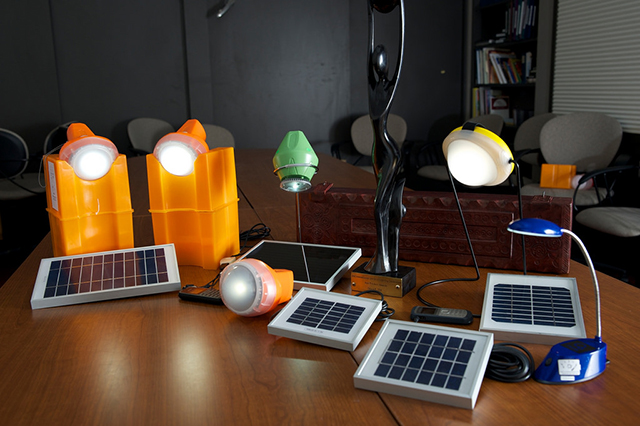The Schatz Center has received a three-year, $1.6 million grant from the International Finance Corporation to lead product quality assurance activities for Lighting Global. The Center is using the funds to run a testing and verification program that enables buyers to distinguish between poor and good quality products.

The work helps bring safe, reliable, and affordable light sources to the roughly 1.3 billion people globally who lack access to grid electricity. An additional $450,000 secured from the World Bank will fund research aimed at expanding the quality assurance program’s scope so that it covers larger solar power systems.
“The original focus was on off-grid lighting products with retail prices ranging from about $8 to $150,” said SERC Director Arne Jacobson, while displaying an example of a low cost solar lantern used to replace kerosene lighting. “(The $450,000 grant) allows us to expand the program to cover larger scale products, like solar home systems that can power a number of electrical appliances.”
SERC has served as technical lead for the program since 2009, two years after its initial involvement with the Lighting Africa initiative was first funded by the World Bank Group. Humboldt State’s responsibilities have grown as the team has built trust based on its accurate evaluations and careful management of proprietary information about the solar lighting products tested through the program.
Quality assurance testing and verification work starts when a commercial entity submits an item for testing. Each off-grid lighting product is evaluated using test methods that are specified by the Swiss-based International Electrotechnical Commission. The test results allow the team at SERC, which includes Jacobson, six staff members and three graduate assistants, to determine if a product meets the Lighting Global Minimum Quality Standards.
If the item passes the test, it’s listed on the Lighting Global website and the manufacturer receives a letter verifying the product meets the requirements. If it doesn’t, the team at Schatz provides feedback to the manufacturer, who might decide to resubmit the item at a later date.
Along with the Arcata-based staff, the Schatz group works closely with associates located in Washington D.C., India, Bangladesh, Kenya, Canada and the San Francisco Bay area. Several personnel are HSU alumni who first became interested in the process as students.
Internet links:
Lighting Global: www.lightingglobal.org
Lighting Africa: www.lightingafrica.org
Lighting Asia: www.lightingasia.org